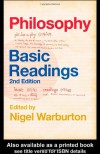Currently reading
Philosophy: Basic Readings
Against Method: Outline of an Anarchistic Theory of Knowledge
Arguably: Selected Essays
Philosophy of Science (Science & Mathematics) (Philosophy & Intellectual History)
David Mitchell: Critical Essays
 2.5 Stars
2.5 StarsI read this as part of the readings required for a course called The Modern And The Postmodern on Coursera given by Weselyan University.
It was a peculiar reading. When I read it first, I had a reaction similar to that of Voltaire when Rousseau sent him a manuscript of one of his later books, The Social Contract:
"I have received your new book against the human race, and thank you for it. Never was such a cleverness used in the design of making us all stupid. One longs, in reading your book, to walk on all fours. But as I have lost that habit for more than sixty years, I feel unhappily the impossibility of resuming it."
This was the stronger in case of the first Discourse on the Arts and Sciences, which is really an impassioned attack against Reason and the notion of progress in Western society. Rousseau makes all sorts of claims to reason his way into showing how humans in state of nature are much more in place than in so-called civilization. One of the shocking lines in the first discourse is:
"Romains, hâtez-vous de renverser ces amphithéâtres ; brisez ces marbres, brûlez ces tableaux, chassez ces esclaves qui vous subjuguent , & dont les funestes Arts vous corrompent."
English Translation:
Romans, hurry up and tear down these amphitheatres, break up these marbles, burn these paintings, chase out these slaves who are subjugating you, whose fatal arts are corrupting you.
This really was a precedent from so respected a figure.
The second Discourse which concerns the origins of inequality was more balanced, though sometimes surpassing the first in speculation and guesswork. He claims that humans in the state of nature were much happier and healthier. Language and family were nonexistent and humans acted more like themselves. Civilization introduced social relations between people which though at first enjoyable resulted in such woes as vanity, cruelty and indifference to suffering, with all being perpetuated by inequality resulting from such social life.
After listening to the commentary of the course and understanding the context in which the guy existed, I tend to see him more with sympathy and understand where he is coming from. Much of the problems he is describing were real and are even relevant today (e.g. how material goods are often nice to have but much painful to lose or how for the rich it is often more important to differentiate themselves from others). He may not convince you with his causal explanations, and certainly not with his solutions to these very human problems, but I believe it is fair to say (as Michael Roth did) that he was the conscience of the Enlightenment. He certainly acts as a balancing force against the certainties prevalent at the time about the merits of reason and the dangerous imperative that many felt to achieve "progress".







